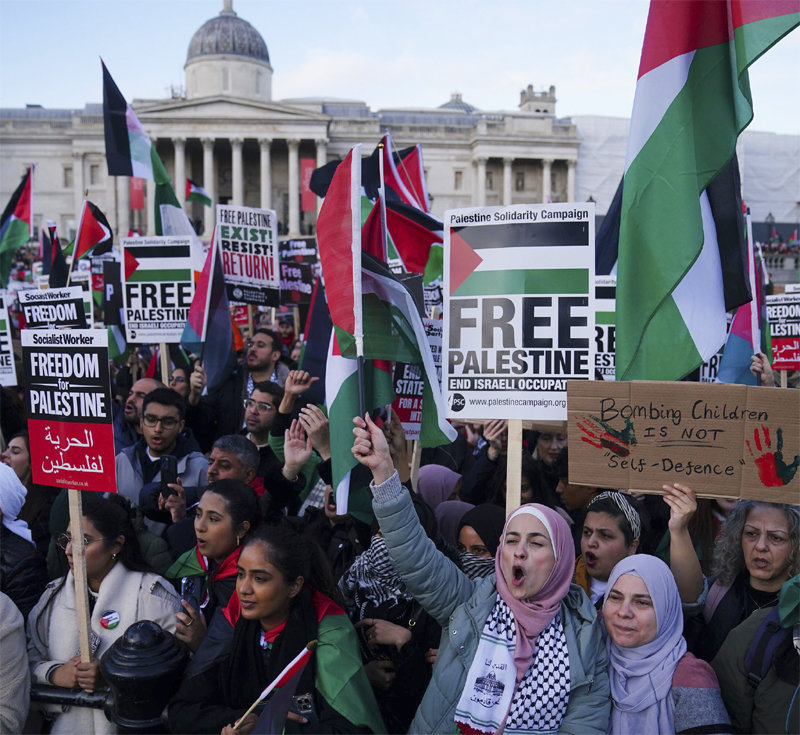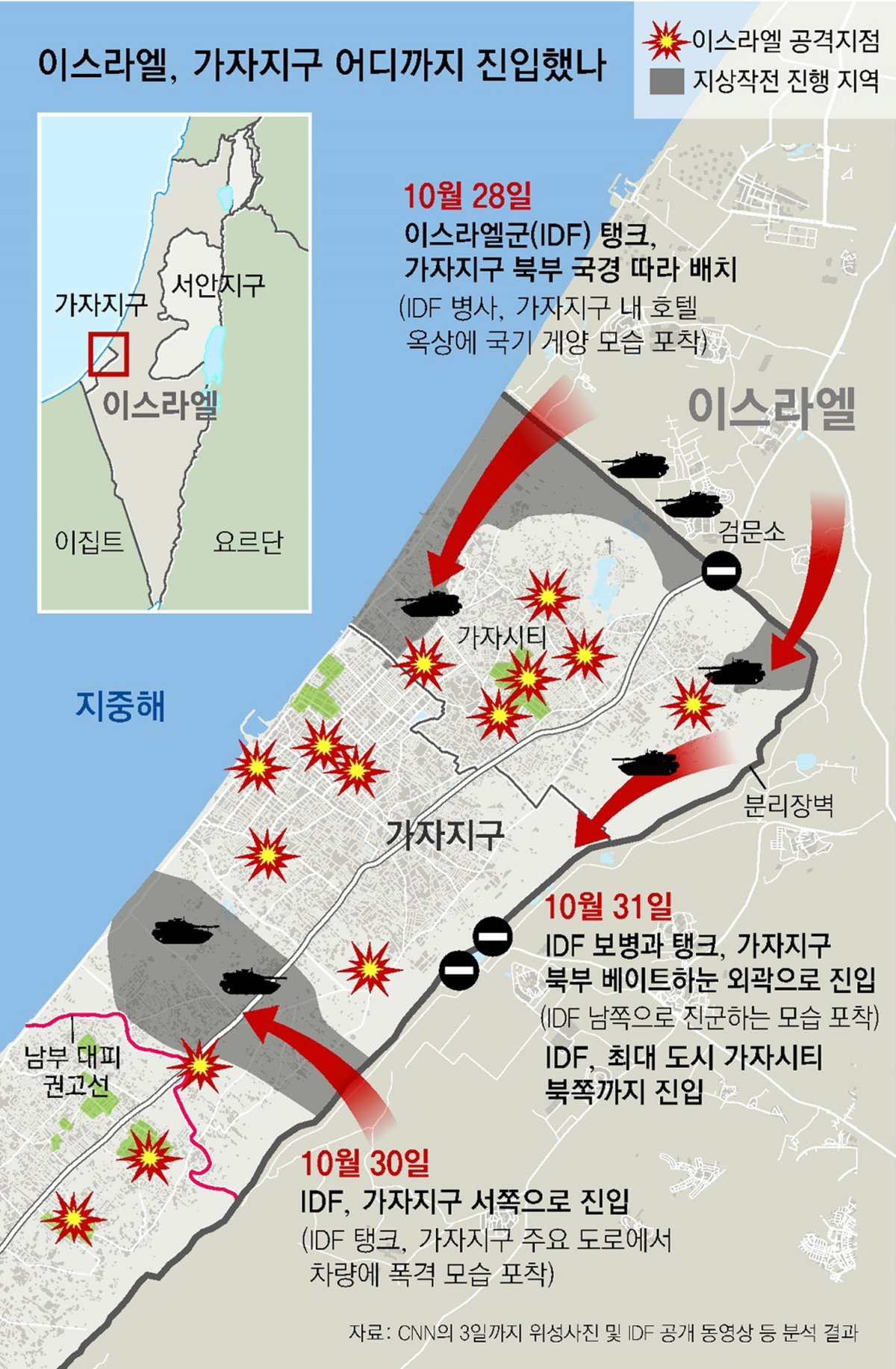[중동전쟁 한 달]
“Hamas hostages must be released first”
“The cruel massacre of civilians must stop”
Lee rejects U.S. proposal to suspend military engagement
 On the 4th, at a rally in support of Palestine held at Trafalgar Square in London, England, demonstrators criticized Israel’s attack on the Gaza Strip by holding up a Palestinian flag and a placard that read ‘Liberate Palestine’ in English. London = AP Newsis
On the 4th, at a rally in support of Palestine held at Trafalgar Square in London, England, demonstrators criticized Israel’s attack on the Gaza Strip by holding up a Palestinian flag and a placard that read ‘Liberate Palestine’ in English. London = AP Newsis“Israel is attacking (Gaza Strip) to eliminate Hamas, but what do the children who have died so far have to do with Hamas?”
A restaurant in downtown Cairo, the capital of Egypt, on the 4th (local time). The Palestinian and Egyptian flags hung side by side at the entrance. Mr. Noha (45), an Egyptian who visited the restaurant, questioned the intensifying war in the Middle East and said, “Israel can attack Hamas members (the Palestinian armed group) as much as it wants. “But what is happening now is tantamount to one-sided ‘ethnic cleansing,’” he said, raising his voice. A restaurant official explained, “We hung up the Palestinian flag to express our anger at the Israeli attack and to encourage our customers to think about the tragedy and stand in solidarity.”
On the other hand, protests were held in Europe and the United States over the weekend, calling on Hamas to release civilian hostages, saying, “We are against anti-Semitism.” They supported the Israeli government’s policy, saying, “In order to achieve a ceasefire, it is right to release the hostages held hostage by Hamas first.”
The Middle East war, which began with Hamas’ surprise attack on Israel on the 7th of last month, marked one month on the 6th. Immediately after the outbreak of the war, Hamas’s brutal massacre of civilians became known, and there was considerable public opinion in the international community supporting Israel’s retaliation. However, as the war intensified due to Israel’s large-scale attack, concerns about war escalation and civilian casualties increased, the world was divided into pro-Israel and anti-Israel public opinion. Voices calling for a temporary cessation of fighting (pause) or a ceasefire (ceasefire) are also growing.
U.S. Secretary of State Tony Blinken, who visited the Middle East for the third time since the war, persuaded Israeli Prime Minister Benjamin Netanyahu on the 3rd to stop fighting temporarily to evacuate civilians, mentioning “how we can minimize civilian casualties while ending Hamas terrorism.” did. However, Prime Minister Netanyahu refused, saying, “We refuse to stop fighting without the release of hostages.” On the same day, Hassan Nasrallah, the supreme leader of the Iranian-backed Lebanese armed group Hezbollah, threatened in a speech that “the possibility of an all-out war could become a reality,” but Israel’s hard-line policy in the Middle East is still focused on limited participation in the war. The war has become impossible to foresee.
Arab countries that had exchanges with Israel and Palestine in the past
Boycott related companies, including McDonald’s
Following “hostage release” rallies in the U.S. and Europe… A series of protests condemning the “ceasefire immediately”
Citizens who met in Cairo, the capital of Egypt, on the 4th (local time) were reluctant to describe the situation taking place in the Gaza Strip as a ‘war’. The military power of the Israeli army and the Palestinian armed group Hamas, which rules the Gaza Strip, is not similar, and the Israeli army is carrying out unilateral bombings not only of military facilities but also of civilian residences. An Egyptian who runs a souvenir shop said, “Hamas was wrong to kill Israelis, but Israel, which pours out bombs knowing that more civilians will be hurt, does not seem to fear God.”
Although there is anti-Israeli sentiment in Egypt due to the past large-scale Middle East war with Israel, it shares a border with the Gaza Strip and Israel and has had relatively frequent exchanges with both sides. Those Egyptians were watching with anxious eyes the news of civilian casualties and threats of escalation of war that were being broadcast every day through broadcasting, saying, “People in other Middle Eastern countries probably think the same way as us.”
 One month of the Middle East war in numbers
One month of the Middle East war in numbersAs the number of innocent civilian casualties increases, the conflict between Israel and the Arab world is deepening. Recently, anti-Israel and pro-Palestinian protests have been frequently held in Cairo. As tensions continued, large armed police forces were stationed in front of the Israeli and Palestinian embassies in downtown Cairo on the 4th, preparing for possible terrorist threats.
Egyptian authorities have recently taken strong action, including detaining more than 100 participants in unauthorized protests. Participants waved Palestinian flags and condemned, saying, “Israel must ceasefire immediately,” and “Israel must disappear.” In addition, it is not difficult to see Palestinian flags hung in stores, residential areas, and vehicles in solidarity.
Egyptian daily Al-Ahram reported on the 3rd, “This is the largest and most influential anti-Israel boycott movement that has taken place in the Middle East in recent years.” In particular, when McDonald’s Israel announced that it was providing free food to the Israeli military, the boycott spread like wildfire. Companies such as Starbucks, Coca-Cola, Nestle, and Netflix are taking a hit because they have sponsored or have ties to Israel. Famous actors who filmed commercials for related companies also took action by expressing their support for Palestine when they were subjected to ‘comment attacks’ on social media. They said, “We do not believe that the boycott will liberate Palestine, but at least it can show solidarity.”
However, some point out that such a boycott is indiscriminate. Some netizens mentioned a specific company and asked, “Is this an Egyptian brand or a foreign brand?” They are even admonishing foreigners, saying, “You shouldn’t have McDonald’s delivered these days.”
Protests calling for a ceasefire and condemning Israel took place simultaneously throughout Europe, including France, the United Kingdom, and Germany, as well as the United States.
According to Reuters on this day, thousands of protesters in downtown Paris, France chanted, “Doing nothing and saying nothing is collusion.” Reuters reported that this protest is considered the largest legal protest permitted by French authorities since the start of the war on the 7th of last month. Protesters sat blocking the street in Trafalgar Square, London, England. They raised their voices, saying, “Stop truce right now” and “We are all Palestinians.”
On the other hand, pro-Israel rallies are also continuously being held. According to Germany’s dpa news agency on the 3rd, about 20,000 people participated in a protest in Vienna, Austria the day before, saying ‘against anti-Semitism’ and calling for the ‘release of hostages’ from Hamas. At a rally held at McGill University in Quebec, Canada on the 4th, it was reported that some far-right participants even raised radical slogans such as “Kill more Palestinian children.”
Conflicts also appear to be intensifying in American universities and the media. Cornell University issued an emergency closure policy due to intensifying conflicts on campus. A New York Times (NYT) reporter signed a statement criticizing Israel’s attack on the Palestinian Gaza Strip as an attempt at genocide, but resigned after being pointed out that he violated NYT policy. The statement also criticized the NYT editorial that conditionally supported Israel’s retaliatory attack.
Cairo =
Paris =
Source: Donga
Mark Jones is a world traveler and journalist for News Rebeat. With a curious mind and a love of adventure, Mark brings a unique perspective to the latest global events and provides in-depth and thought-provoking coverage of the world at large.
